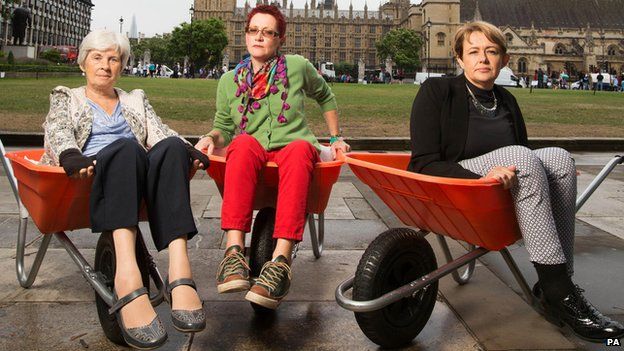Wheelchair services in England 'are failing'
- Published

One of Great Britain's most successful Paralympians has said wheelchair services across England are failing on every level.
Baroness Tanni Grey-Thompson has launched a new national charter to improve services across the country.
Some people wait years for the right wheelchair and an ill-fitting chair can cause hip dislocations, pressure sores and make disabilities worse.
NHS England said the whole system needed to change.
There are about 1.2 million wheelchair users across the UK, but NHS England said the figures were old and work needed to be done collecting data locally to get a detailed picture of what was happening across the country.
Baroness Grey-Thompson, who launched the Right Chair Right Time Right Now campaign, said the standard of wheelchair services differed greatly depending on where a person lived.
She gave examples of some people waiting three months for a suitable chair and some waiting seven years under a different NHS trust.
'Huge problem'
Most worryingly, she explained, is hearing stories of people with life-limiting conditions, such as Motor Neurone Disease, dying before they get their wheelchair, spending the last few months of their lives trapped inside their homes.
But it is not just a moral responsibility, Baroness Grey-Thompson said.
"I think the problem is huge, not just the wait times, but the ultimate cost to the NHS. If people aren't sitting on the right cushion, they're not in the right chair, it's causing harm to people."
If you have a long-term or permanent disability and need a wheelchair, in most cases this is how it works:
- You'll start by getting a referral from your GP to the NHS wheelchair services
- You'll then be assessed to determine your physical and social needs, where you live and work will also be taken into account
- Next, a decision will be made on whether there's a need for a chair
Those who work in the service say a lack of national guidelines and funding means it is in need of reform.
Krystyn Jarvis, of the National Wheelchair Managers' Forum, said wheelchair services were not seen as an important part of the NHS.
"We have been asking for change for more than 20 years. We know the situation isn't acceptable," she said.
"But because every locality commissions differently, you were always going to get this postcode lottery."
'Shared ambition'
Baroness Grey-Thompson has launched the charter in the hope that services, clinical commissioning groups and NHS trusts across England will sign up to it.
She posed in a wheelbarrow alongside otherwise wheelchair users in front of the Houses of Parliament to highlight the importance of the right chair.
Although the charter isn't mandatory, the Wheelchair Leadership Alliance is hoping that its 10-point pledge will be the first step to a fair and effective service for those who need it.
NHS England said it "absolutely shared the ambition of the Leadership Alliance that wheelchair users and their families should be supported to lead full, independent and active lives".
"For the first time ever we have set up a rigorous data collection mechanism, and our work to both pilot a tariff for wheelchairs and support commissioners will also help implementation of the charter locally," it added.
- Published24 April 2015
- Published13 November 2014
- Published6 October 2014